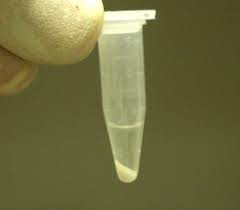Wrong.
It's funny, but due to the nature of our experiments (deals with invisible stuffs / dependent on organisms / easily contaminated / etc), sometimes determining the cause of our failure was not that straight forward. And when the logical reasons cannot explain our problems, we often look for the 'otherworldly' reasons.
Did I tie my hair correctly? Have I changed my lab coat recently? Was this a punishment because I did something? Yeah, those kinds of stuffs.
One of the most common procedure in molecular biology lab is DNA extraction. DNA, or deoxyribonucleic acid, are basically small molecules that act as blueprints for our body (well, not just us, but every living things actually). The molecule was normally dissolved in water and too small for our eyes to see. In conventional DNA extraction, at one point we will need to precipitate the DNA and compacted it into small pellets.
Even when you can't see the pellets, it's actually possible that the DNA were there and you just can't see it because it's too small. But still, if you've repeated this step over and over, even a slight setback would hurt your confidence, and maybe get you a wee bit more religious. "Oh God please please please let me have those darn pellets!"
DNA Pellets, making scientists more religious since 1960s
For me, I think this kind of superstition is just a learning phase. Deep down, we knew that our superstition are not rational and more likely to be wrong, but for now, we'll stick to it rather than getting confused in the unknowns. Human brain loves to connect the patterns, and any kinds of 'reason' is probably easier for our brains to handle. I believe that as we continue to study further, we'll know better, and eventually we'll outgrew the phase. Well I hope, at least.
But enough talking for now, I need to get my beauty sleep for my
DNA extraction tomorrow ;) See ya!

No comments:
Post a Comment